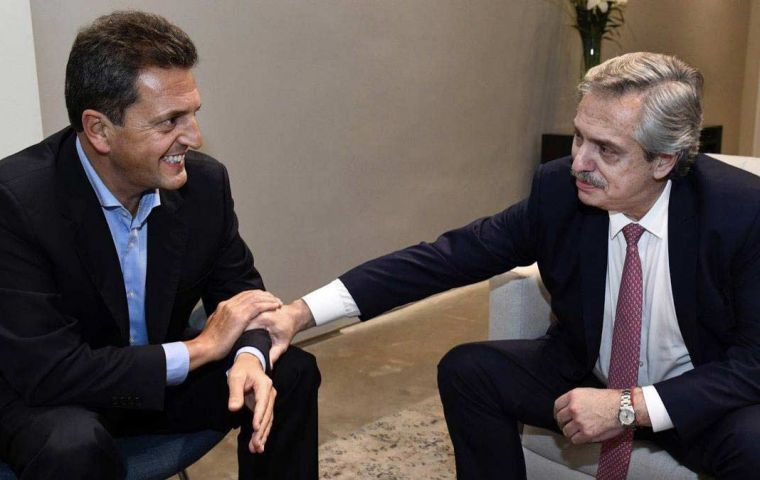MercoPress. South Atlantic News Agency
Massa among world's top economy personalities of 2022, says Folha
 Massa (L) became some sort of prime minister who saved Alberto Fernández'(R) s government from a political crisis, Folha said
Massa (L) became some sort of prime minister who saved Alberto Fernández'(R) s government from a political crisis, Folha said Argentina's Sergio Massa has been named among the 10 most influential people of the year in the economic and financial world by the leading Brazilian newspaper Folha de Sao Paulo. The list also includes Elon Musk, Jerome Powell, Bernard Arnault, and Christine Lagarde.
Musk, CEO of Tesla and Starlink, bought Twitter this year for US$ 44 billion, after which numerous accounts were restored to users who had been banned for publishing content deemed controversial by the previous owners. Musk officially launched his offer to acquire the company on April 14 but the deal was not finalized until October. “In early November, he made massive layoffs across the company, some 7,500 worldwide,” Folha explained.
LVMH CEO Arnault became the richest man on Earth in 2022. The Frenchman's family has a fortune worth US$ 188 billion, after the fall of Tesla shares displaced Musk. “Arnault had already briefly taken the top spot among the richest in 2021 when he overtook the then-richest man in the world Jeff Bezos, founder of Amazon. The top spot in the ranking of billionaires has not been held by a European since October 2015,″ the newspaper explained about the owner of Louis Vuitton and dozens of other brands ranging from champagne to five-star hotels.
India's Gautam Adami overtook billionaire Jeff Bezos, founder of Amazon, to reach the position of second richest person in the world in 2022. He owns India's largest business conglomerate and has a fortune estimated at US$ 150 billion. His holding company operates in areas such as coal mining, port and airport management, cement manufacturing and gas distribution, and renewable energy production.
Federal Reserve Chairman Jerome Powell was behind this year's global inflation management as the US benchmark interest rates went up in March for the first time since 2018, ”signaling the start of what would be an aggressive monetary policy to combat inflation even with the uncertainties generated by the Ukrainian War, which had just begun,” Folha argued.
Lisa Cook became the first black woman to serve on the board of the U.S. Federal Reserve's board of directors. She holds a PhD in economics from the University of California, with research on the labor market and racial disparities.
Mauricio Claver-Carone was dismissed in September as CEO of the Inter-American Development Bank (IDB) following allegations that he had had an affair with a female employee. He was heavily resisted after being proposed for the job by former US President Donald Trump breaking a six-decade tradition of a Latin American chief in September 2020. He was replaced by the Brazilian Ilan Goldfajn, who had been until then a leading International Monetary Fund (IMF) official.
European Central Bank President and former IMF Executive Managing Director Christine Lagarde also had to deal with a sharp increase in prices. Folha insisted inflation kept its upward trend due to the war in Ukraine. Under her, the ECB raised Eurozone rates for the first time in 11 years.
Kwasi Kwarteng was appointed UK finance minister on Sept. 6 by then-Prime Minister Liz Truss. His tax cut package led to a plunge in British debt securities, eventually leading to Truss' resignation.
Former Fed chairman Ben Bernanke received the 2022 Nobel Prize in Economics along with Douglas Diamond and Philip Dybvig for their inquiries into why banks are necessary, why they are vulnerable, and what to do about it through their academic research.
Folha highlighted Sergio Massa's taking over the enlarged Economy Ministry in Argentina, “saving Alberto Fernandez's government.”
“Massa went on, in practice, to act as an Argentine prime minister,” Folha insisted. “The new super-minister announced a package of measures to try to give stability to the country with a review of social spending and the strengthening of the Central Bank's reserves to circumvent the debt, in a pro-market wink. Thus, Fernández saw in Massa the opportunity to recover the economy and to [save his] government, taken away, at that moment, by the political crisis with the vice-president [Cristina Fernández de Kirchner],” concluded the São Paulo newspaper explained.




Top Comments
Disclaimer & comment rulesCommenting for this story is now closed.
If you have a Facebook account, become a fan and comment on our Facebook Page!